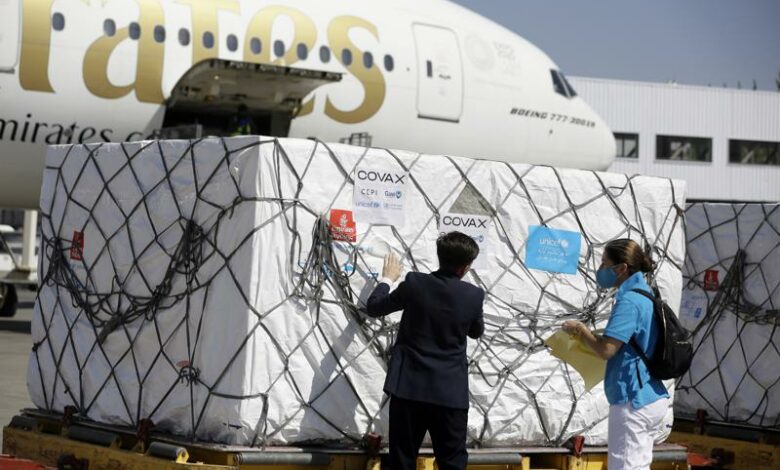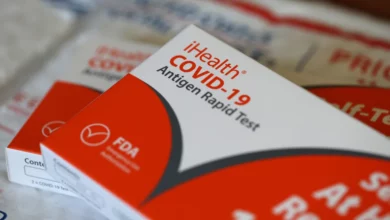
LONDON — Low-income countries were supposed to get COVID-19 vaccines through a shared international system instead of waiting at the back of the line for unreliable donations from rich countries.
It hasn’t worked out that way. Some rich countries bought up doses through the initiative known as COVAX despite already having vaccines. Britain received more than twice as many COVAX doses in June as the entire continent of Africa.
A tally by The Associated Press shows many poorer countries have landed in exactly the predicament the initiative was supposed to avoid.
Brook Baker, a Northeastern University law professor who specializes in access to medicines, says it’s unconscionable that rich countries would dip into COVAX vaccine supplies when more than 90 developing countries have no access. COVAX’s biggest supplier, the Serum Institute of India, stopped sharing vaccines in April to deal with its surge of cases.
Often rich countries don’t want to donate significant amounts before they finish vaccinating all their citizens. The U.S. never got any doses through COVAX, although Canada, Australia, New Zealand, Qatar, Bahrain and Saudi Arabia are among those that did. Canada got so much criticism for taking COVAX shipments that it won’t request more.
Venezuela has yet to receive any doses from COVAX. Haiti has received less than half of what it was allocated, Syria about a 10th. In some cases, officials say, doses weren’t sent because countries didn’t have a plan to distribute them.
British officials confirmed the U.K. received about 539,000 vaccine doses in late June and has options to buy another 27 million shots through COVAX.
The COVAX initiative, run by the World Health Organization, has delivered less than 10% of the doses it promised so far. COVAX is also in partnership with the vaccine alliance Gavi and the Coalition for Epidemic Preparedness Innovations, a group launched in 2017 to develop vaccines to stop outbreaks.
___
MORE ON THE PANDEMIC:
— COVAX only goes so far as rich countries dominate global vaccine allotments
— Iran will impose 6-day ‘general lockdown’ against coronavirus
— More U.S. cities requiring proof of vaccination to go places
— Canada to require those traveling by air and train to be vaccinated
___
— Find more AP coverage at https://apnews.com/hub/coronavirus-pandemic and https://apnews.com/hub/coronavirus-vaccine
___
HERE’S WHAT ELSE IS HAPPENING:
TEHRAN, Iran — Iranian state media says authorities will impose a six-day “general lockdown” in cities across the country.
The lockdown includes bazars, markets and public offices, as well as movie theaters, gyms and restaurants in all Iranian cities. The lockdown begins Monday and will last through Saturday. The national coronavirus taskforce, which issued the decision, also ordered a travel ban between all Iranian cities from Sunday to Friday.
Also Saturday, Iran reported 29,700 daily cases and 466 deaths. The pandemic totals stand at 4.3 million confirmed cases and 97,208 confirmed deaths.
Iran remains far behind other countries in vaccinations, with only 3.8 million of its more than 80 million people having received both vaccine doses.
Many front-line medical workers have been vaccinated with Iran’s locally produced shots, or the Chinese Sinopharm vaccine, which may be less effective than other inoculations.
Iran’s government announced its homemade vaccine provides 85% protection from the coronavirus, without disclosing data. Iran also imports Russia’s Sputnik V vaccine, along with the Oxford-AstraZeneca shot through the U.N.-backed COVAX program.
Iran’s Supreme Leader Ayatollah Ali Khamenei in January called vaccines from the U.S. or Britain “forbidden.”
___
MOSCOW — Russia reported 819 daily coronavirus deaths on Saturday, the third straight day of record numbers.
The government’s coronavirus task force says there were 22,144 confirmed cases. Russia has been struggling with a surge of infections since early June. Confirmed cases went from about 9,000 a day at the beginning of the summer to more than 23,000 a day in early July.
Officials blamed the surge on the spread of the delta variant and sought to boost vaccine uptake, which has remained lower than in many Western countries
Russia has reported more than 6.5 million infections and 169,683 confirmed deaths since the start of the pandemic.
___
NEW YORK — In a growing number of places across the United States, people will be required to show proof of coronavirus vaccination to teach school, work at a hospital, see a concert or eat inside a restaurant.
Starting next week, New Orleans and San Francisco will require such proof to enter many businesses. New York City was the first to require proof of vaccination to dine inside restaurants, go to a gym or theater. Los Angeles is also looking into the idea.
The new measures are an attempt to stem the tide of cases that pushed hospitals to the breaking point, including in the Dallas area, where top officials warned they are running out of beds in their pediatric intensive care units.
___
SYDNEY — Australia’s most populous state reported a daily record 466 coronavirus cases Saturday and increased fines for breaches of pandemic restrictions.
The previous record tally in New South Wales, home to Sydney, was 390 reported on Friday. Four people had died overnight, bringing the death toll in New South Wales from an outbreak of the delta variant first detected in Sydney in mid-June to 42.
New South Wales Premier Gladys Berejiklian says fines for breaking pandemic rules such as breaching quarantine orders had been increased from 1,000 Australian dollars ($737) to AU$5,000 ($3,685).
Sydney residents will be restricted to within 5 kilometers (3 miles) of home, half the distance they were previously allowed. All of New South Wales would be locked down from 5 p.m. until Aug. 22.
Deputy Premier John Barilaro tweeted that the stay-at-home orders were to minimize movement and protect regional communities from the evolving COVID-19 situation in Sydney. Police supported by the military will crack down on Sydney residents who breach stay-at-home orders from Sunday night.
Sydney has been in lockdown since June 26, 10 days after the first delta case was detected.
___
MONTGOMERY, Ala. — Alabama Gov. Kay Ivey issued a state of emergency as state hospitals face a surge in COVID-19 cases, an order that came the same day the state tied a record low for available intensive care unit beds.
Ivey issued a limited state of emergency aimed at giving medical providers flexibility on staffing and capacity decisions and easier shipment of emergency equipment and supplies. The Republican governor stressed she would not be issuing any closure orders or mask mandates.
”I want to be abundantly clear: there will be absolutely no statewide mandates, closures or the like. This state of emergency is strategically targeted at removing bureaucracy and cutting red tape wherever we can to allow our doctors, nurses and hospital staff to treat patients that come through their doors,” Ivey said in a statement.
The order came as medical providers described a “tidal wave” of COVID-19 cases that is putting severe stress on Alabama hospitals. The state on Friday tied the record low for available intensive care unit beds with just 39 vacant beds statewide, said Dr. Don Williamson, the former state health officer who now heads the Alabama Hospital Association.
Of the state’s 1,567 intensive care unit beds, 689 are filled with COVID-19 patients and just 39 are empty.
___
HONOLULU — A new wave of the coronavirus pandemic has Hawaii in “crisis” mode, with the state recording its highest single bump in cases and hospitals making overflow plans, Gov. David Ige said.
Ige says nearly 1,170 new infections were reported Friday, That includes a small number of cases from previous days that were delayed because of a technical glitch, but still represents the largest single increase since the start of the pandemic.
“Friday the 13th has never been so frightening. It is real and it is terrifying,” Ige said. “And tragically, it’s preventable.” The vast majority of new cases are among unvaccinated people, officials said. Ige urged people to get vaccinated.
Hawaii had an average of 729 cases in the past three days, Ige says. It has a population of nearly 1.5 million people. The seven-day state positivity rate is now 7.4%.
Ige says hospitals are filling up and preparing for it to get worse. The governor says, “they are treating younger and younger people,” and included the recent death of a man in his 30s.
___
PORTLAND, Ore. — Oregon’s governor says she will deploy up to 1,500 National Guard troops to hospitals around the state to support healthcare workers as the COVID-19 surges amid the rapid spread of the Delta variant.
Gov. Kate Brown, a Democrat, says starting Aug. 20 she will send an initial 500 Guard members to serve as equipment runners in hospitals and help with COVID-19 testing, among other things.
There are 733 people hospitalized with the virus in Oregon, including 185 in intensive care units. Hospitals have warned they are near capacity as the state endures a fourth wave of the outbreak.
___
SALT LAKE CITY — Coronavirus patients are filling Utah hospitals beyond capacity.
Officials with the state’s largest health care system say intensive care units are at 102% capacity. Intermountain Healthcare doctors say about 90% of the hospitalized coronavirus patients are not vaccinated.
Infectious disease physicians say the surge driven by the highly contagious delta variant is especially concerning as the new school year begins without a mask mandate for children who cannot yet be vaccinated. Officials worry about school outbreaks that could spread to families.
___
COLUMBIA, S.C. — A South Carolina health system is rescheduling surgeries and reassigning nurses after two of its hospitals topped 100% capacity as the delta variant spurred a new wave of coronavirus cases in the state.
Tidelands Health says it’s also opening two temporary clinics to treat patients with COVID-19-like symptoms as a way to bring down emergency department volumes.
Elsewhere in the state, hospitals are limiting visitors and entire high school football teams are being quarantined as schools newly reopened for the fall semester grapple with outbreaks.
In Pickens County, school board members called an emergency session Friday after 534 students and 28 staff members were quarantined two weeks into the school year. Kershaw County School District, which also began classes last week, quarantined 701 of its 11,033 students by Friday.
Coronavirus cases are soaring toward rates not seen since the height of the pandemic last winter, before vaccines became widely available. On Friday, health officials confirmed 3,585 new cases and 15 deaths, and total daily case counts have risen above 2,000 for the last 12 days.
___
PULLMAN, Wash. — Washington State University says students will soon no longer be able to cite a “personal or philosophical” exemption to the school’s requirement that all who attend get a COVID-19 vaccine.
The university says those exemptions would be nixed once the Food and Drug Administration grants full approval to vaccines now allowed under an emergency authorization.
It wasn’t immediately clear what effect the school’s new policy would have on football coach Nick Rolovich, who has opted not to get a vaccine. “Discussions also are underway about changes to the faculty and staff vaccination policy,” the university said.
More strict vaccine requirements are implemented because of the delta variant of the coronavirus, which has caused spikes in cases and hospitalizations throughout Washington state. Classes begin at WSU on Aug. 23.
___




